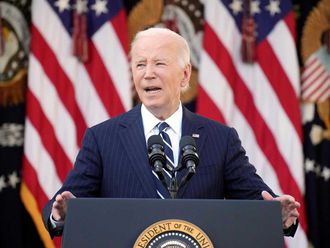Munster, Indiana: The first American citizen diagnosed with a mysterious virus from the Middle East is improving daily and could be released soon from an Indiana hospital, although he will be isolated at home, health officials said on Monday.
The man has been hospitalised at a Munster, Indiana hospital since April 28. Officials said he fell ill with Middle East Respiratory Syndrome, or MERS, after flying to Chicago last month from Saudi Arabia, where he is a health care worker at a hospital in Riyadh.
The patient is an American citizen, a spokesman for the Centres for Disease Control and Prevention said on Monday. The World Health Organisation said he was in his 60s.
While health officials said the virus is not highly contagious, the hospital isolated at home 50 employees identified as having come in contact with the man before he was diagnosed, said Dr Alan Kumar, chief medical information officer at Community Hospital, where the man has been treated.
Also as a precaution, members of the man’s family have been told to stay home and wear masks if they leave, Kumar said.
No health workers or family members who’ve had contact with the patient have tested positive for the virus, which has an incubation period of two to 14 days and appears in most cases within five days, said Indiana State Department of Health Commissioner William VanNess II.
VanNess II said discovery of the MERS case in Indiana was “a scary situation.”
“There are a lot of unknowns as you’ll find out about this particular virus,” he said. “As a physician, the father of five sons and grandfather to six, I understand the concerns and worries.”
Since MERS was discovered two years ago, at least 400 people have had the respiratory illness, and more than 100 people have died. All had ties to the Middle East region or to people who travelled there.
The MERS patient in Indiana flew from Riyadh, Saudi Arabia to the United States on April 24, with a stop in London. He landed at Chicago’s O’Hare International Airport and took a bus to Indiana, health officials said. He went to the emergency room last Monday with a fever, cough and shortness of breath.
“He no longer has any oxygen requirements. He’s in good spirits. He’s eating well and we have started the discharge planning process at this time,” Kumar said.
The patient understands he will need to remain isolated when he leaves the hospital, Kumar said. The man does not recall working directly with a MERS patient in Riyadh but said the hospital where he worked did have some MERS cases, officials said.
Federal and state officials are still trying to contact about 100 people who may have been on the aeroplane or bus with the patient. About three-quarters of the people on the plane had been contacted, said Dr. Daniel Feikin, an epidemiologist with the CDC. State health department spokeswoman Amy Reel said the state was using credit card receipts to try to reach passengers who were on the bus from O’Hare to Highland, Indiana. The CDC said 10 bus passengers had been tested.
After the patient was determined to be at-risk for MERS, he was isolated in a room that has a contained air system, Kumar said. The hospital was able to identify employees who came in contact with him by reviewing video surveillance and checking radio trackers on employee identification badges that monitor where employees have been, Kumar said.
Medical personnel who now come in contact with him wear gloves, a gown, mask and eye protection, Kumar said.
MERS belongs to the coronavirus family that includes the common cold and SARS, or severe acute respiratory syndrome, which caused some 800 deaths globally in 2003. There is no known cure.
Feikin said there are no known cases of the virus spreading through casual contact, but it was not surprising MERS had reached the United States.
“We know that infectious diseases do not respect international boundaries. In this day and age of global travel and trade, infectious diseases can spread almost anywhere,” he said.
Saudi Arabia has been at the centre of a Middle East outbreak of MERS, and the virus has spread among health care workers, most notably at four facilities in that county last spring.
The MERS virus has been found in camels, but officials don’t know how it is spreading to humans. It can spread from person to person, but officials believe that happens only after close contact. Not all those exposed to the virus become ill.












